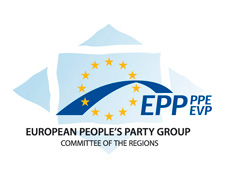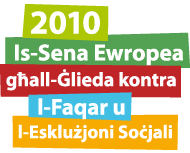"Poverty and social exclusion have complex and multi-dimensional facets. We therefore have to continue to work together to put our common proposals into practise. Only through joint efforts can we combat poverty and provide a decent social, economic and cultural life for all of Europe’s citizens" concluded Michael Schneider, President of the European People’s Party Group in the Committee of the Regions at the end of its meeting in Poznan on 18 June. This call for action was echoed by the host Marek Wozniak, Marshal of Wielkoposka Region who added: "only through the implementation of a strong European cohesion policy in cooperation with the local, regional and the national levels of government can the EU stand a chance to promote a more cohesive society."
Bringing together more than 60 local and regional political representatives from across the EU27, this meeting of the EPP Group in the Committee of the Regions was an opportunity to debate the causes of regional disparities and social exclusion with EU representatives and experts. In his opening remarks, President Schneider stated "cohesion policy can largely contribute to reducing the disparities between Europe's regions and fostering solidarity. In order to do so, we believe that cohesion policy should retain a significant share of the EU budget and be a priority axis of the future shaping of financial perspectives. Furthermore, just one day after the European Council adopted the Europe 2020 Strategy we stress that a strong and well financed cohesion policy, with its horizontal approach, is necessary for successful attainment of the EU 2020 goals as well as for achieving social, economic and territorial cohesion."
Janusz Lewandowski, European Commissioner for Budget and Financial Programming, underlined the need to consider the budget review in the context of the financial crisis. “This needs to be an ambitious, realistic programme which accurately reflects the current reality. If cohesion policy is to be a substantial part of the future budget, we need to prove the efficiency of regional policy and no institution is better suited to do this than the Committee of the Regions.” Making a direct plea to the Commissioner, Ramón Luis Valcárcel Siso, 1st Vice-President of the Committee of the Regions, stressed that a stable multiannual financial framework is also an essential precondition for ensuring the effectiveness of the European Union's action. "The CoR has therefore proposed that the programming period of the multiannual financial framework be extended to 10 years, allocating the total funds for the first five years and then reassigning the amounts in reserve, for example 25% as part of a genuine mid-term review; this approach would make it possible to ensure consistency with the European electoral timetable." The Committee of the Regions is the only institution to propose an alternative to the existing seven year arrangement.
Looking to the immediate future, the 1st Vice-President called on the European Commission to find a way to ensure that the full 1.23% of Gross National Income (GNI) is received from the Member States, as determined by the Council for the 2014-2020 period or in alternative the use of non spent credits in given weak budget lines towards other budget lines to maximise their added value. "If this could be achieved, the community budget would have an extra €27 billion, which would make a significant difference for the regions and cities in certain countries" he concluded.
Lambert van Nisterooij MEP, EPP coordinator of the Parliament's Committee on Regional Development, spoke about the successes achieved under the Lisbon Treaty and the development of cohesion policy over the past 20 years before referring to the cooperation between the two EPP Groups in the European Parliament and the Committee of the Regions. Referring to the joint conclusions of the EPP Group in the European Parliament’s meeting in Budapest where the two EPP Groups agreed that there should be one Europe wide cohesion policy with the same three objectives of promoting competition, job creation and interregional cooperation and the same criteria that have worked in the past. “Specifically at this time of crisis, we should not make cohesion policy more complex. We should keep GDP and allow flexibility for the Member States, regions and cities to select the relevant criteria” he said.
In the Poznan Declaration, which was unanimously adopted at the end of the meeting, the Group puts forward a number of action points for enhancing social, economic and territorial cohesion in the future. Outlining this declaration, President Schneider drew attention to the initiative to establish a Territorial Pact of Regional and Local Authorities on the Europe 2020 Strategy. "Through such a Pact, the EPP hopes to promote strong multilevel ownership through effective partnerships at the European, national, regional and local levels" Michael Schneider explained. "We believe that through this initiative, we will be able to actively contribute to the Europe 2020's Flagship Initiative "European Platform against Poverty" by developing social inclusion agendas on the ground making local social services more effective and accessible for all. Moreover, at this time of economic difficulty, the Pact should help those citizens who are excluded from the labour market" he concluded. The proposal, which stems from the two EPP Groups in the Committee of the Regions and the European Parliament also has the support of the European People's Party.










